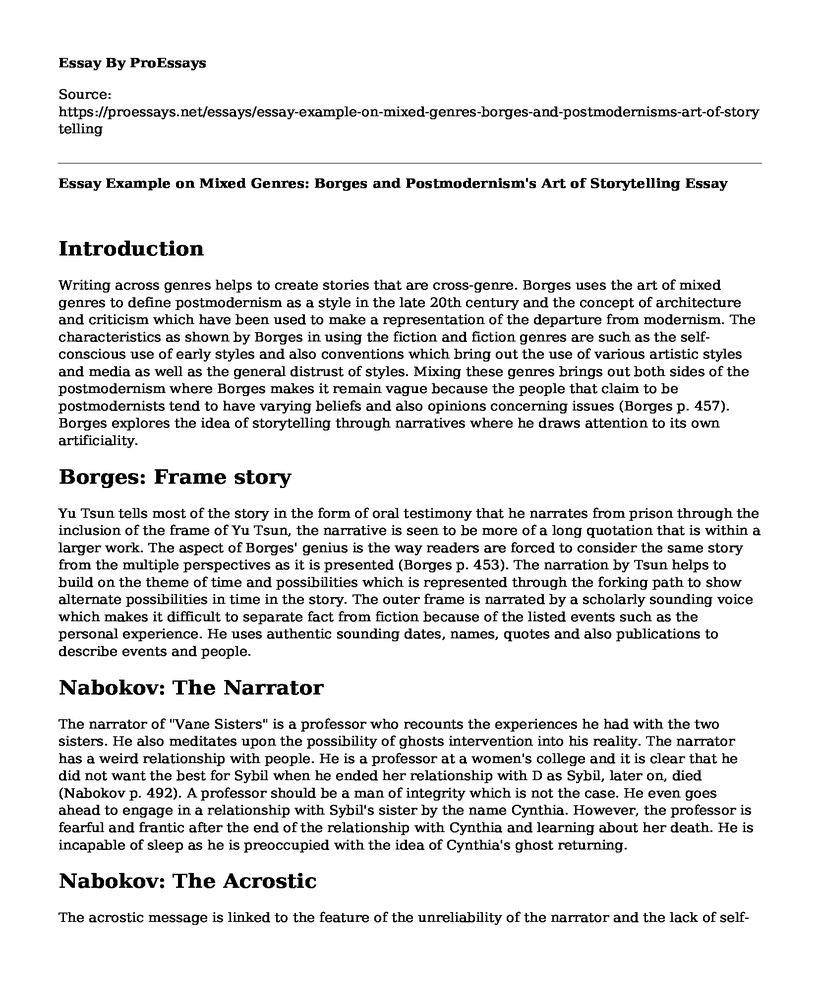Introduction
Writing across genres helps to create stories that are cross-genre. Borges uses the art of mixed genres to define postmodernism as a style in the late 20th century and the concept of architecture and criticism which have been used to make a representation of the departure from modernism. The characteristics as shown by Borges in using the fiction and fiction genres are such as the self-conscious use of early styles and also conventions which bring out the use of various artistic styles and media as well as the general distrust of styles. Mixing these genres brings out both sides of the postmodernism where Borges makes it remain vague because the people that claim to be postmodernists tend to have varying beliefs and also opinions concerning issues (Borges p. 457). Borges explores the idea of storytelling through narratives where he draws attention to its own artificiality.
Borges: Frame story
Yu Tsun tells most of the story in the form of oral testimony that he narrates from prison through the inclusion of the frame of Yu Tsun, the narrative is seen to be more of a long quotation that is within a larger work. The aspect of Borges' genius is the way readers are forced to consider the same story from the multiple perspectives as it is presented (Borges p. 453). The narration by Tsun helps to build on the theme of time and possibilities which is represented through the forking path to show alternate possibilities in time in the story. The outer frame is narrated by a scholarly sounding voice which makes it difficult to separate fact from fiction because of the listed events such as the personal experience. He uses authentic sounding dates, names, quotes and also publications to describe events and people.
Nabokov: The Narrator
The narrator of "Vane Sisters" is a professor who recounts the experiences he had with the two sisters. He also meditates upon the possibility of ghosts intervention into his reality. The narrator has a weird relationship with people. He is a professor at a women's college and it is clear that he did not want the best for Sybil when he ended her relationship with D as Sybil, later on, died (Nabokov p. 492). A professor should be a man of integrity which is not the case. He even goes ahead to engage in a relationship with Sybil's sister by the name Cynthia. However, the professor is fearful and frantic after the end of the relationship with Cynthia and learning about her death. He is incapable of sleep as he is preoccupied with the idea of Cynthia's ghost returning.
Nabokov: The Acrostic
The acrostic message is linked to the feature of the unreliability of the narrator and the lack of self-awareness. The message describes the beliefs of Cynthia in manifestations from the afterlife. The belief that she has is that they will take the form of short moments in the life of a person who is influenced by the spirit of another person (Nabokov p. 503). Cynthia's theory has postulated the elation of the narrators sort of manifestation. He is unaware about it which shows the lack of acuteness throughout the narrative and the lack of consciousness. The acrostic message changes the narrative as it shows the use of trickery to overweigh the importance of the subject but with a masterful construction of the story.
Works Cited
Borges, Jorge Luis. "The garden of forking paths." Collected fictions 119 (1962).
Nabokov, Vladimir. "The Vane Sisters." The Hudson Review11.4 (1958): 491-503.
Cite this page
Essay Example on Mixed Genres: Borges and Postmodernism's Art of Storytelling. (2023, Jan 16). Retrieved from https://proessays.net/essays/essay-example-on-mixed-genres-borges-and-postmodernisms-art-of-storytelling
If you are the original author of this essay and no longer wish to have it published on the ProEssays website, please click below to request its removal:
- Article Analysis Essay on Impact of Knowledge Management on the Activation of E-Commerce Using Social Media
- Essay Sample on Music from Kenya in Sub-Saharan Africa
- The Razor Edge Analysis Essay Example
- Yoguslav the Black Wave Essay Example
- The Picture of Dorian Gray Novel Analysis Paper Example
- Essay Sample on Victor & Henry: Closest Friends in Mary Shelley's Frankenstein
- Essay Sample on Soliloquies: Uncovering the Innermost Beliefs of Characters







